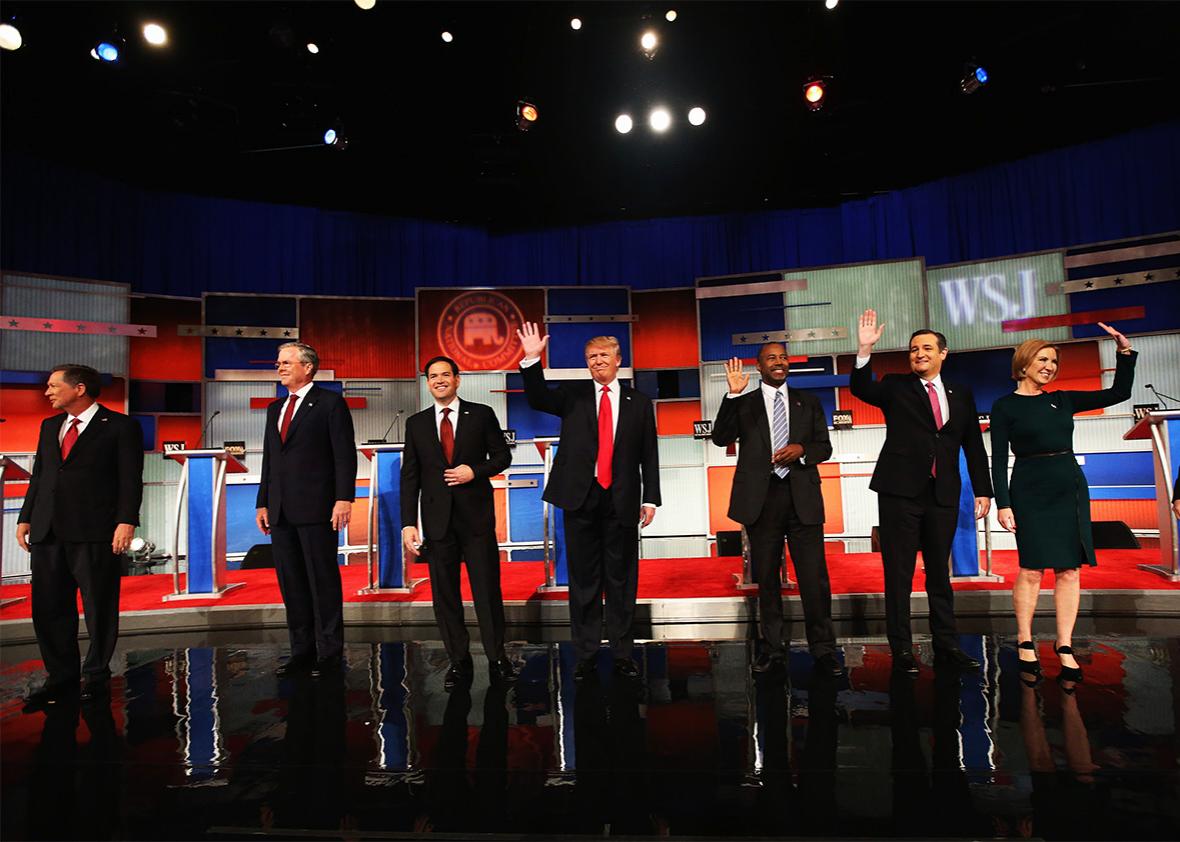In September, the Republican National Committee bound itself to Donald Trump in a transparently desperate effort to keep the real estate mogul from bolting the GOP to make an independent run for president. “I [name] affirm that if I do not win the 2016 Republican nomination for president of the United States I will endorse the 2016 Republican presidential nominee regardless of who it is,” read the RNC’s loyalty pledge, circulated to all the candidates in the race. “I further pledge that I will not seek to run as an independent or write-in candidate nor will I seek or accept the nomination for president of any other party.”
Donald Trump never left the party. Instead, he bent it to his will, spurning the Republican establishment to score a long string of victories on the strength of his nativism, bigotry, and naked authoritarianism. Today, he is the front-runner in the Republican presidential primary, the guy with the most delegates, the most votes, and the clearest shot at the nomination. And on Tuesday, facing his two remaining rivals, he broke the pledge that was supposed to keep him from damaging the GOP. “I don’t anymore,” said Trump at a CNN town hall when moderator Anderson Cooper asked him if he stood by the pledge. “I have been treated very unfairly,” he explained.
This, thus far, is the least surprising thing to have happened in the Republican primary. RNC chairman Reince Priebus conceived the pledge as a way to protect Republicans from a potentially wild and untamable Trump. But in practice, it tied the party to Trump’s fortunes, not theirs. And with Trump on the verge of victory, it’s clear that this pledge was an important assist on his path to dominance.
Before Trump signed the pledge, he had two major problems. First, as a recent convert to the Republican Party, he lacked a measure of legitimacy, which his rivals exploited for attacks. And second, the leverage of a third-party run was undercut by the problem of ballot access in the primary itself. As long as Trump refused to stand with the GOP, state party organizations had every right to keep his name off of their ballots. By signing the pledge, Trump made himself official with little cost to himself.
That is the crucial point. The RNC pledge wasn’t legally binding and didn’t require anything of the real estate mogul. He even retained a small amount of leverage. “I just wanted fairness from the Republican Party,” Trump said at the time. “I will be totally pledging my allegiance to the Republican Party and the conservative principles for which it stands.” Unspoken, but understood, was this: If fairness didn’t come, the deal wouldn’t hold.
This changed the dynamic of the primary. On paper, at least, Trump was a Republican. Rivals couldn’t fully disavow him; they’d signed the pledge, too, committing their support to Trump if he won the nomination. Which meant that at every turn, traditional candidates such as Marco Rubio and Jeb Bush were affirming Trump’s qualifications for the presidency, even as they blasted his positions, his temperament, and his profound ignorance of public affairs. The pledge, in other words, gave Trump legitimacy.
Today, Trump holds almost 50 percent support among Republicans nationwide. For millions of GOP voters, he is the most legitimate person in the party. Given that support, Trump doesn’t need the pledge anymore—it has served its purpose. As such, he has discarded it in a mocking rebuke to a party establishment that thought it could corral Trump and now wants to maneuver around him. But just as the pledge failed, those maneuvers won’t work either. Republican elites have no way out.
If Trump stands for election in the fall, the party will lose. His popularity within the GOP obscures the extent to which he is the least popular figure in American politics, with negative ratings that exceed any ever recorded. Trump is so unpopular that Democratic strategists are beginning to plan for doing the once unthinkable—winning a majority in the House of Representatives.
If Republican elites try to knock Trump off of the ticket through arcane convention rules and procedures, they will alienate his supporters, who form a large plurality of the party. Whether they stay home or join Trump in a write-in bid for the presidency—it’s almost too late to make an independent run—the Republican Party loses.
To be fair to Republican leaders, the pledge isn’t the reason Trump is close to winning the party nomination. It merely helped. But Priebus and his allies had a choice. They didn’t have to try to accommodate Trump and his movement. They could have disavowed him and his rhetoric, even if it risked a third-party candidacy. They could have said, “Never Trump” when a stiff repudiation from the usual gatekeepers might have stopped him cold. Instead, they have to watch a strongman unleash the ugliness and hate that has simmered under the surface of the party for years.
As for what that looks like? Hours before Trump broke the RNC pledge, he held a rally in Janesville, Wisconsin, home to Speaker of the House Paul Ryan. There, supporters attacked a 15-year-old protester. One man allegedly groped her, another hit her with pepper spray, and yet another egged them on. “You goddamn communist nigger-lover,” said someone in the crowd, “get the hell out of here.”
See more of Slate’s coverage of the 2016 Republican primary.
